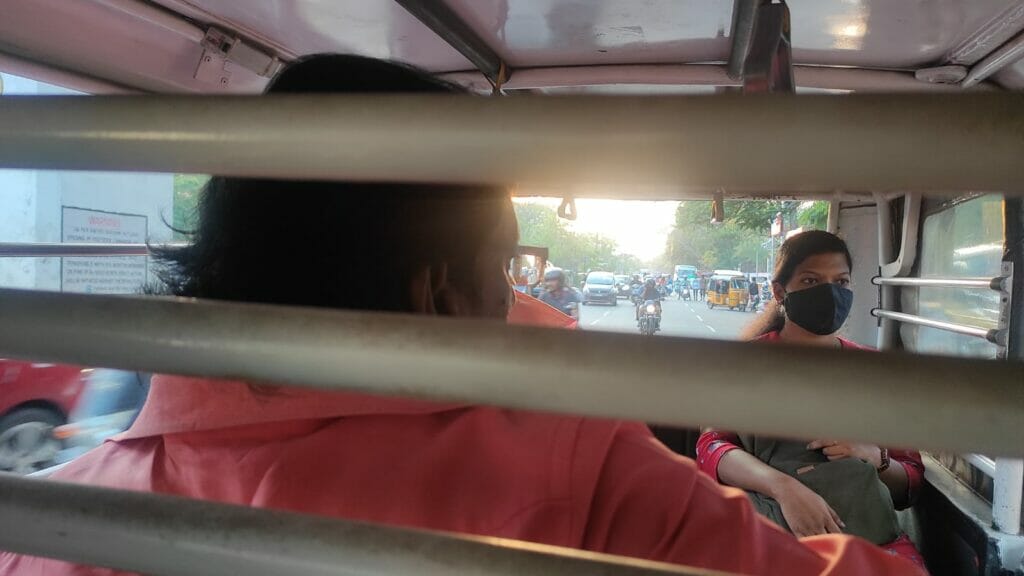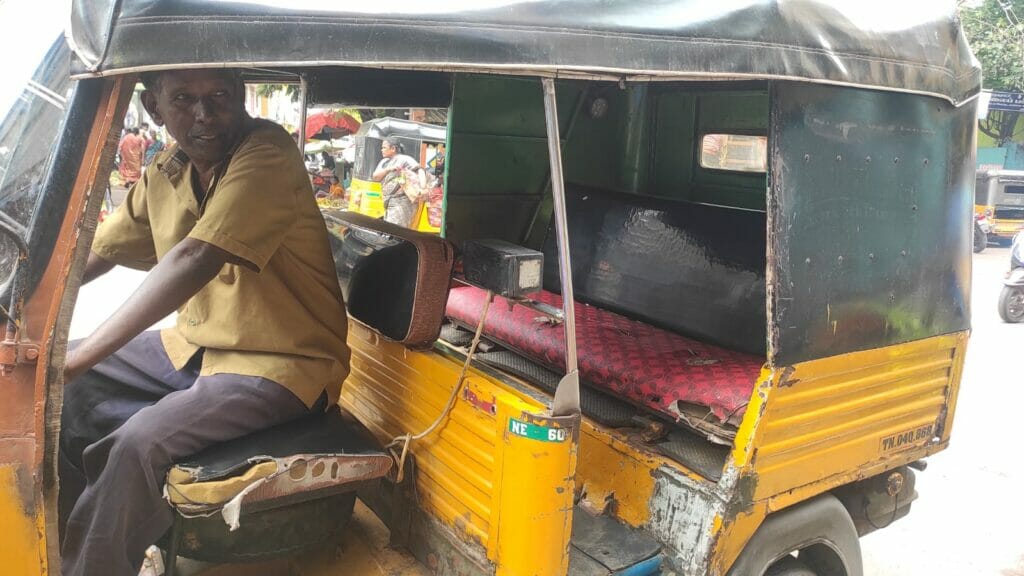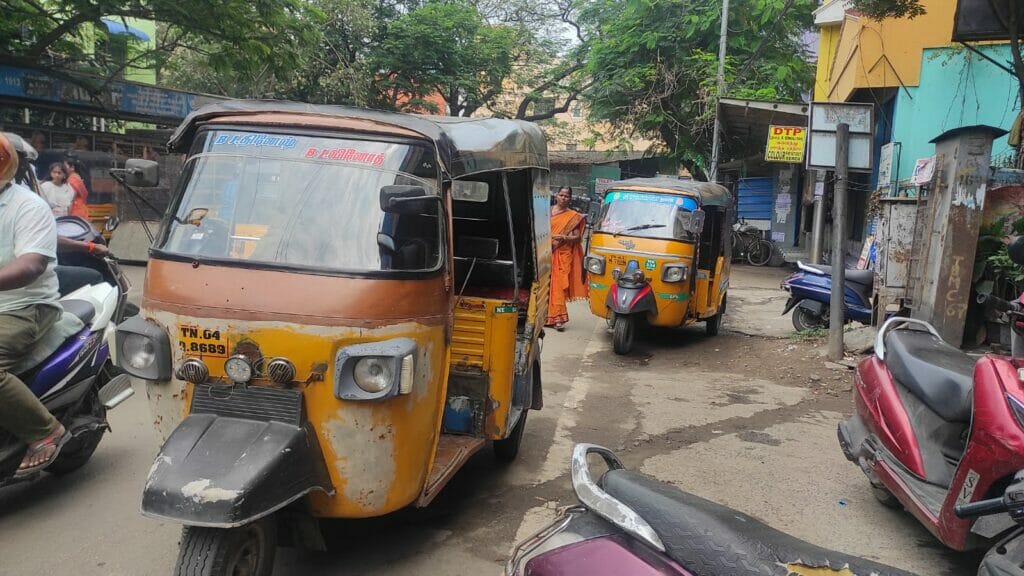“I board a share auto near my house in Virugambakkam to the metro station in Ashok Nagar to get to work every day. I use a share auto on my return as well,” says G Balakumar, a frequent share auto-user in Chennai.
Over the years, share autos have become an integral means of first and last-mile connectivity for many in the city. They fill a necessary gap and bolster the use of public transport in the city by providing a reliable and cheap mode of transport.
With a growing user base, it becomes necessary to bring in some form of regulation to ensure passenger safety and a minimum standard of service provided by share autos.
To this end, the Chennai Unified Metropolitan Transport Authority (CUMTA) is considering bringing share autos under the umbrella of public transit modes in the city. This will provide recognition for the service rendered by the share autos, which at present operate in a regulatory vacuum.
Read more: Chennai’s popular ‘share autos’ operating illegally
Permits an issue for share autos in Chennai
Many share autos run on contract carriage permits, where the autos can go from point A to point B, without stopping somewhere in the middle. However, every share auto that plies on the city roads defies that rule, dropping and picking up people at will along their given routes.
“I pay Rs. 300 to Rs. 500 as a penalty for just driving a share auto to the traffic police. I show the challan if caught again the same day and go about working. Before, cops used to stop us every day. Now, they do so occasionally,” says Maari, a share auto driver who operates in Tondiarpet.
“It would be good to not have to pay fines. We are not doing something wrong. I hope the regulation makes us a legal entity so that we can do our job freely,” says Kumar, a share auto driver in Ashok Nagar.
“Even after regulation, it would be good if they let us do our job without hindrance like how we are doing at the moment,” expects Maari.
“How many days will we be operating illegally? We want to be given stage carriage permits and be recognised as a legal paratransit entity,” says S Balasubramaniam, state president of CITU’s (Centre of Indian Trade Unions) auto union. “This will give us a guarantee.”
Stage carriage permits are given for public buses (at this moment in Chennai) where the commuters can be picked up and dropped in different points across a route. Under section 72 of the Motor Vehicles Act, 1988, these permits are issued.
If provided these permits, share autos can pick up and drop people at various “stages” along point A to point B, and do so legally.
The State Transport Authority will also be able to fix fares for different distances under the stage carriage permit, similar to MTC buses.
Aspects of regulation of share autos in Chennai
Regulation can also address issues such as fares, designation of routes and standardisation of the type of vehicles that can be operated as share autos in Chennai.
Many commuters want fixed fares as it varies during different times.
“At night time, after 11 pm, they [share auto drivers] charge Rs. 30 from one stop to another. But during the day, it is only Rs. 10 for the same distance,” says Nithya, a passenger from Virugambakkam.
Apart from that, commuters also want the number of passengers to be limited based on the capacity of the autos.

Tata Magic share autos have a seating capacity of seven people plus the driver. However, most Tata Magic share autos add a couple of wobbly plastic stools at the end of the share auto to accommodate more passengers.
In areas with more footfall, like Pondy Bazaar, share autos ply with 10 people apart from the driver in.
“It is unsafe to travel in crowded share autos,” says Nithya.
There are other smaller models of share autos such as the Piaggio Ape that can be spotted in the streets of Chennai.
“In the Ape auto, four people can sit. But if the seat is pushed towards the back, there is another bench below the seat. At times, share autos take even ten people in those smaller Ape autos, making it hard for us to travel, especially if men sit in crowded autos. When there is more footfall, auto drivers push the seat back,” Arockiya Sagaya Mary, a resident of New Washermanpet who uses share autos regularly.

Prabhakaran, a resident of Tambaram, is also a frequent user of the Ape share autos. “We wish CUMTA standardises Tata Magic share autos and remove or reduce Ape autos. Here, we mostly see only Ape autos, which are highly uncomfortable.”
Speeding of share autos is also a concern, say many commuters, and want rash driving to be penalised.
“Bringing them into the formal transit system, we can also set speed limits for them,” says Santhosh Loganaathan, Deputy Manager of the Institute for Transportation and Development Policy (ITDP).
Read more: Will CUMTA finally get going with a push from the World Bank partnership?
Competition with buses unlikely
There is a notion that share autos compete with MTC buses in Chennai, eating into the MTC’s share of commuters. Therefore, only 100 share auto permits under carriage contracts are given every year by the government while there are around 61,000 share autos in the city.
But the ground reality is that Chennai does not have enough buses catering to its burgeoning population.
According to the benchmarks of the Union Ministry of Housing and Urban Affairs, there should be 60 buses per lakh population. But, Chennai has around 3400 to 3500 buses, which is not enough.
“Chennai needs 6500-7000 buses to cater to the current population estimate,” says Santhosh.
To ensure share autos do not compete with bus routes, CUMTA is looking at non-bus route roads to allow share autos.
“But there is no data [yet] to prove that they are competing with buses. In some routes, that may be the case. But in other routes, we find that share autos are just supplying to the demand [of transit need],” says Santhosh.
“Where will we go then, if not bus routes? We will not find business on interior roads. Already there is free bus travel for women and private buses will start plying on the road soon. Are they trying to ruin our livelihoods?” asks a share auto driver from Ashok Nagar.
“If buses are frequent and not crowded, we will not depend on share autos,” says Balakumar Ganesh, a share auto user from Virugambakkam. “To bridge the gap, we need share autos on bus routes.”
Earnings are also very meagre for share auto drivers. This could be affected further if share autos are limited to non-bus route roads.
“We earn very less. I take home around Rs. 100 to Rs. 600 every day, after spending on diesel and rent for the vehicle. If I am caught by a cop, then I run into a loss. I am hardly able to make both ends meet. I also have two daughters studying in a private school, and I have to pay Rs. 10,000 as school fees in a couple of months,” shares Augustine, a share auto driver from North Chennai. “It will be highly unfair if they take us off bus routes.”
Share autos also act as a feeder service to buses in parts of the city.
Share autos in North Chennai have proven to be very useful to take passengers from major bus route roads to narrower roads, where buses do not ply, say commuters. To cater to the demand for share autos, the normal auto rickshaws become share autos in North Chennai, for example- while taking passengers from Parrys to Tondiarpet.
“Many prefer share autos over cabs and autos via ride-hailing apps, because the former is affordable,” says Malar, a share auto commuter from Thiruvottiyur.
Some areas in Chennai need paratransit modes like share autos to improve connectivity as bus services are inadequate. “For the last three decades, we have only one bus service- M9M, from AGS Colony to T Nagar via Guindy. We need more connectivity to other parts of the city, and share autos can ply here,” says R Kanagaraj, President of AGS Colony RWA, Velachery West.
Feasibility study for regulation of share autos
“We will conduct a feasibility study in May for regulation of share autos, which will be part of the World Bank-funded Chennai City Partnership project. We will be able to talk more about the regulatory aspects after the study,” says I Jeyakumar, Special Officer of CUMTA.
“When we [quantitatively] understand how share autos operate in Chennai, it will help share autos complement with other transit modes, in a more formalised way. So, it can act as feeder services, to ensure better first and last-mile connectivity,” says Santhosh.
If share autos are brought into the formal economy there is also the possibility to ensure the service becomes eco-friendly.
“These autos are run by diesel or LPG, contributing to a lot of emissions. The government could think about offering subsidies and formalise electric share autos,” says Santhosh.
Sumana Narayanan, Senior Researcher at Citizen Consumer and Civic Action Group recommends some steps for a robust feasibility study.
“The government needs to have conversations with share auto associations and unions for the study. This will help them get over any trust deficit they may have with the officials while decisions are made. Then, it is important to speak with commuters to understand how share autos are meeting their transit needs,” says Sumana.
“The government should collaborate with share auto drivers to solve connectivity issues and also ensure that they can make a livelihood,” says Sumana. “The first priority is to make them legal by giving them the right permits.”
Formalising share autos will not only strengthen public transport but will also reduce the dependence on private vehicles in Chennai. Moreover, this would lead to safer and more comfortable services for the passengers, helping them to seamlessly transition between different modes of public transport.

Happy Morning Padmaja,
A matured and structured writing pattern you have.
I recollected all my days travelling in share autos. If you ask me i will always prefer to travel in auto than in buses for reasons many. So as a share auto passenger i can very well relate to your writing and 100 percent agree with few of your observations….
While completing reading the article fully, i also realise that there is life behind these auto drivers…
The data collection on No. Of buses, no of share autos, the population count are awesomeness..
With great good heart i am wishing and praying that you will go to greater heights…
The concerns of passengers and the concerns of the auto drivers and the concerns of MTC buses were nicely captured…
Aa always superb writing..
My best wishes…
Padmaja, thank you for writing this article – share autos are such an important part of the transit mix in Chennai that we really do need to understand their impact and how the situation can be improved.
However, I think in this case, apart from fixing max passenger count and regulating speed, I’m not able to see why the government needs to step in to regulate share autos? What good can they possibly do?
It is appalling to hear that the government’s position is for share autos to run on non-bus route roads. In what world does this make any sense? Share autos augment bus capacity – if we had enough buses to provide convenient, comfortable, and affordable service, why would people choose share autos?
It’s because MTC doesn’t have or run enough buses that we turn to other modes of transport. Share autos are a response to conditions that exist in the city: the drivers are entrepreneurs who understand local demand and fill gaps that exist. An appeal to the “authorities” – PLEASE DO NOT OVER-REGULATE A SYSTEM THAT WORKS!
Regarding price, I think it would quite dangerous to fix fares – why not let a competitive system decide the price? If we fix fares, then there’s a need to regularly update them, which the government doesn’t do often. According to a report in Times of India, auto unions say that the fares have only been revised 4 times in the past 4 decades, which seems insane.
I really hope that sense prevails and there’s minimal useful regulation of share autos and nothing more.
In white color share auto they are forcing 12 members to sit and charging more also, in the auto which i travel today two girls were literally crying because of insufficient place, she got back bone pain, why there is no rules passed to these share autos, kindly provide strict rules and regulations, also the roads of the chennai is not so good, in that condition filling these many people will create huge Problem, kindly government pls look into this, the condition of the auto is also very worst